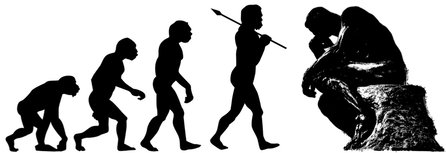That's the question we'll be diving into for pretty much the rest of the series. Most of the research into that question has been done by neuroscientists, but before we get to them, there's one more pure philosopher we ought to consider to help set the stage, and that is Dan Dennett. Dennett has been prominently working on consciousness for decades. I'll be honest that I've never gone back and read his 1991 doorstopper Consciousness Explained, but I figure his 2017 book From Bacteria to Bach and Back: The Evolution of Minds would supplant that now. Plus, the neuroscience has exploded since 1991, so why go back? The wikipedia entries that I've linked to for those books offer very quick summaries, but I'm going to focus in this post on a Google Talk that Dennett gave about FBtBaB. Here are the most important points from his hour-plus talk:
- The history of life is an R&D project, a design process that exploits information in the environment to create, maintain, and improve the design of things.
- R&D takes time and energy. There are two main types: evolution by natural selection, and human intelligent design. There have been intelligent designers for only about 100,000 years. You should not read back our intelligent design efforts into nature.
- Evolutionary design is purposeless, foresightless, extremely costly (99% of everything that ever lived died childless), and very slow. Intelligent design is purposeful, goal directed, somewhat foresighted, governed by cost considerations, and relatively fast.
- A termite mound might be 70 million clueless termites. A brain might be 86 billion clueless neurons. There are no captains, lieutenants, or generals in the brain. How [then] do you get a mind capable of intelligent design out of such a brain?
- Short answer: You can’t do much carpentry with your bare hands, and you can’t do much thinking with your bare brain. A termite colony is a bare brain. Intelligent designers have well-equipped brains. They have thinking tools.
- Long answer: Cultural evolution designed thinking tools that impose novel structures on our brains: virtual machines that could travel and be installed on different brains to give them powers they otherwise didn’t have (“apps we download into our necktops”).
- Darwin’s strange inversion of reason: in order to make a perfect and beautiful machine, it is not necessary to know how to make it.
- Turing’s strange inversion of reason: in order to be a perfect and beautiful computing machine, it is not necessary to know what arithmetic is.
- These yield Dennett’s bumper sticker: Competence Without Comprehension
- The upshot of this is that the mind (consciousness, understanding, etc.) is the effect, not the cause. It’s not a mind-first universe; it’s a matter-first universe. Minds came recently.
- There’s a difference between how come ("Why are planets spheres?") and what for ("Why are ball bearings spheres?"). The teleology of "what for" enters the world gradually. Darwin showed that it didn’t always have to be there.
- Panpsychism is the view that everything is conscious. And I almost agree with it, but I just have to change the view a little bit. I call my view “pan-niftyism” — every atom is nifty, every electron is nifty. The question then is, is there any difference between panpsychism and pan-niftyism? They both explain the same thing—nothing. To say conscious things are made out of conscious things doesn’t necessarily follow. Colored things aren’t made of colored things.
- The (Paul) MacCready Explosion: 10,000 years ago, human population plus livestock and pets were approximately 0.1% of terrestrial vertebrate biomass. Today, it is 98%. This is probably the biggest, fastest, biological change on the planet ever. Genes don’t explain it. Technology does.
- [The creation of] eukaryotic cells was one of the first great transfers of technology. A recent one is the invasion of human brains by symbiotic thinking tools called memes.
- These memes are “free floating reasons” as opposed to the reasons that saturate the biotic world. Trees, fungi, bacteria, non-human animals, etc. all do things for reasons. But they aren’t aware of them. We can be.
- Bach was a top example of experimenting with purpose. He deeply understood his instruments and the history and theory of music in order to prolifically produce genius compositions. How [then] to get from blind genetic evolution to Bach?
- First step is synanthropic words. Synanthropic means things that thrive along with humans (e.g. seagulls, cockroaches, etc.). Nobody owned the first words; they were just habits that developed. [E.g. screeching for certain predators or specific dangers.]
- Next are domesticated words. Domesticated means the reproduction is controlled. For words, this means conscious choosing of one over the other. This leads to differential replication. Meanings or pronunciations can change over time, but the best ones survive, usually without even noticing why.
- The next step are coined words, deliberately designed, although their survival is still down to selection. Then there are technical terms, which are very carefully designed, and curated under strong group pressure. E.g. phenotype vs. genotype. These are hyper-domesticated words.
- This describes the age of intelligent design—ever-controlled more and more in a top-down method. Now, however, we are entering the age of post-intelligent design, where we have learned that the power of evolution is smarter than we are so we can create without comprehension. [Thus going from Bach back to bacteria.]
Brief Comments
I really don't have much to add to this other than that it's a good introduction to the ideas that complexity can arise very gradually without foresight, and the cultural evolution of language is a good hypothesis for providing an instrumental difference maker in the kind of minds that we humans have. If you are reading this post on a website called evolutionary philosophy, you probably already agree with this. But I wanted to stop and make this point specifically before l go on a deeper dive into Dennett's thoughts in the next post.
Oh and I had to share this talk because I loved Dennett's quip about pan-niftyism. That surrender to explaining nothing is essentially my view of the panpsychists' project (if you can even call it a project). So, this post puts a nice bow on the end of that discussion too.
What do you think? Do you have any hesitations or questions about the role evolution can play in the history of that thing we currently call consciousness?
--------------------------------------------
Previous Posts in This Series:
Consciousness 1 — Introduction to the Series
Consciousness 2 — The Illusory Self and a Fundamental Mystery
Consciousness 3 — The Hard Problem
Consciousness 4 — Panpsychist Problems With Consciousness
Consciousness 5 — Is It Just An Illusion?



